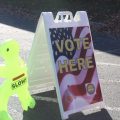On Oct. 30, 2020, The HR Department hosted “Civic Engagement 102: What Happens After the Election?”
The program featured professor Kevin Baron with a presentation that comes after the first part of the series, “Civic Engagement 101: Elections and You,” which was hosted in early October.
Election Day was on Nov. 3 and the polls indefinitely closed as results were anticipated.
Baron’s presentation focused on the next steps of what to do after the election. Conversations surrounding delayed elections, election security, and the question of who will serve as the next president of the United States are at the forefront of American concerns.
Baron also referenced the record high numbers of early voting which has occurred nationally and the thousands of absentee ballots that have yet to be received.
Baron used the U.S. Elections Project to discuss the increases seen in voter turnout. During the early voting period, approximately 97 million early votes were cast as of Nov. 2.
Due to the massive levels of early voting, Baron mentioned that students should not expect the election results to be instantaneous. Although the last day to vote is much earlier, the Electoral College will cast their electoral votes on Dec. 14.
On Jan. 6, the U.S. Congress will certify the electoral election results. The next president will then be inaugurated on Jan. 20.
Although we must wait to find out who the next president will be, past data can be analyzed to make educated guesses on potential election outcomes. Baron discussed some of the shifts in voter attitudes across demographics as well as the influence of swing states on the election.
“Young voters could sway the election if they show up to vote–and that’s a big if,” Baron said.
Baron’s insights reflect recent trends in voter attitudes that suggest young voters are more invested in this election.
Baron also noted how a scholarly consensus cannot be accurately made to predict the winner of the election. Concerns also surround the possibility of Trump rejecting election results if he is not the winner.
“This would require extra-Constitutional recourses,” Baron stated. “We’ve never been here before.”
In the event that Biden loses, Baron discussed evidence suggesting that protests would erupt in disapproval of the loss.
Heavy implications surround the election and the results may be unprecedented. So, what should the campus watch out for?
Baron advises students to keep an eye on key states such as Florida and Pennsylvania. Texas, Arizona, and Georgia are also swing states this year and will play a pertinent role in deciding the final outcome.
However, even outside of swing states, your vote does matter in this pivotal election cycle. For individuals who are voting on Nov. 3, information about polling locations and hours can be found on the Tennessee Secretary of State’s website.
Although the polls will soon close, civic engagement does not end in this election. More campus resources on elections, voting, and civic processes can be found at apsu.edu/vote.





